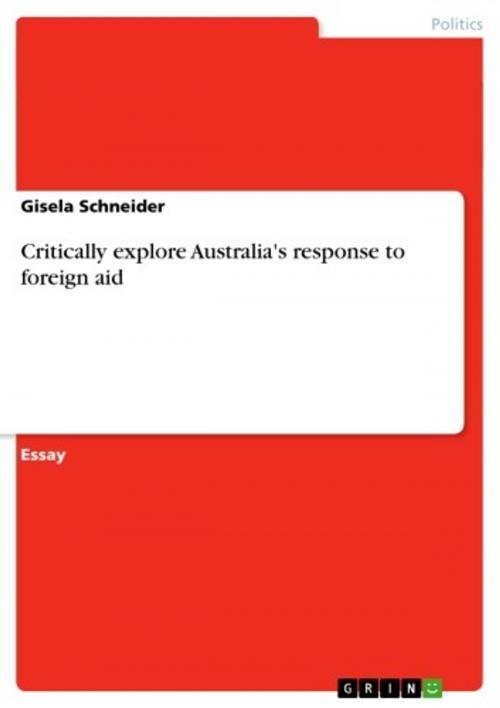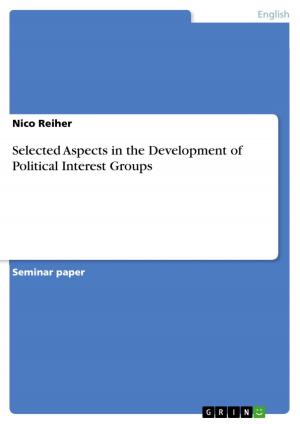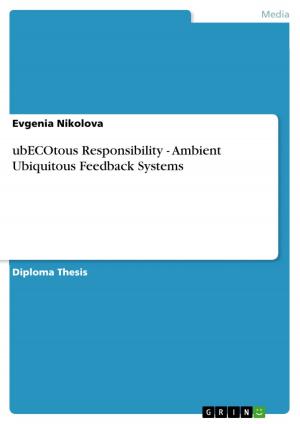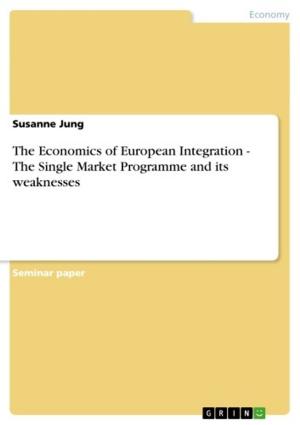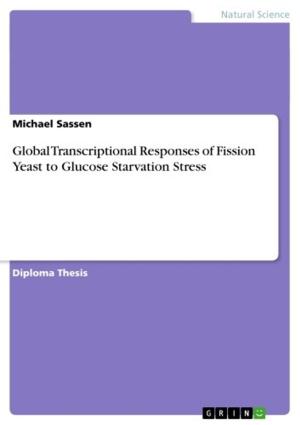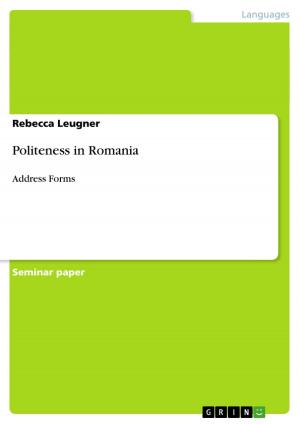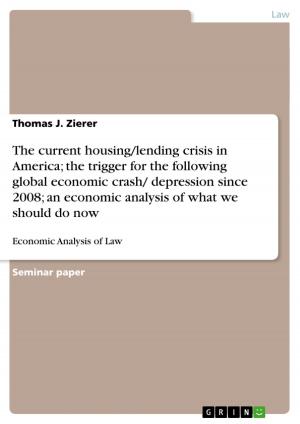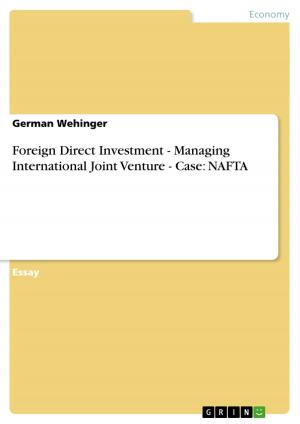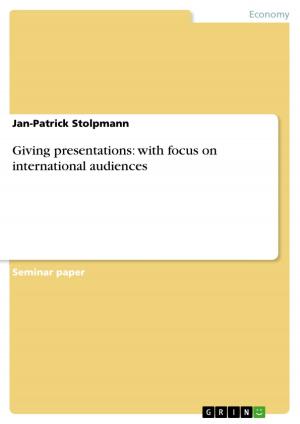Critically explore Australia's response to foreign aid
Nonfiction, Social & Cultural Studies, Political Science, International, International Relations| Author: | Gisela Schneider | ISBN: | 9783638201780 |
| Publisher: | GRIN Publishing | Publication: | July 4, 2003 |
| Imprint: | GRIN Publishing | Language: | English |
| Author: | Gisela Schneider |
| ISBN: | 9783638201780 |
| Publisher: | GRIN Publishing |
| Publication: | July 4, 2003 |
| Imprint: | GRIN Publishing |
| Language: | English |
Essay from the year 2002 in the subject Politics - International Politics - Region: Australia, New Zealand, grade: 1 (A), Southern Cross University, Lismore (Politics), course: Peace, War and international Politics, 12 entries in the bibliography, language: English, abstract: In an era of globalisation, the gap between rich and poor is growing. Mass poverty is still one of the most important economic and social problems. To reduce the existing inequalities, economic assistance of the richer countries is needed. This procedure is often part of the foreign policy of a country's government and is called foreign aid or also official development assistance (ODA). It comes in a variety of forms like grants, loans, export credits or technical and military assistance and can be used for a variety of purposes. In June 1992, the world's richest countries, including Australia, recognized at the Earth Summit in Rio that 'poverty alleviation was crucial to global sustainable development' and therefore 'reaffirmed their commitment to the United Nations (UN) [aid] target of 0.7 per cent Gross National Product (GNP)'. While the world's richest countries steadily increase their wealth, aid to developing countries however declines. In 2000, the average of given aid was at about 0.24 per cent GNP whereat only Denmark, the Netherlands, Norway and Sweden met the UN target. One of the reasons for this development is certainly the fact that aid is rather used for economic purposes than devoted to the ethical and selfless commitment for direct poverty reduction in countries which need the money most. This fact and the incorrect allocation may be the reason that over the past fifty years the sum of $1 trillion in aid given to poor countries has mostly failed. The purpose of this essay is to demonstrate the difference between what is actually happening and what, in my opinion, should be happening concerning Australia's response to foreign aid. As said, Australia's aid budget is not meeting the UN target. From a moral point of view, the country's government therefore should spend a higher amount for development purposes, reallocate the distribution of aid and follow a framework of ethical principles. I will fortify this thesis with an overview of the countries past and actual approaches to development assistance programs, which are mainly shaped by a realistic mentality and therefore are seen as controversial. I will further focus on the countries biggest moral dilemma, the fact of the inseparability of human rights and economic interest which has essential influence on their distribution of aid. This is also connected to controversial debates raised in the national and international context, which will be evaluated under an ethical point of view.
Essay from the year 2002 in the subject Politics - International Politics - Region: Australia, New Zealand, grade: 1 (A), Southern Cross University, Lismore (Politics), course: Peace, War and international Politics, 12 entries in the bibliography, language: English, abstract: In an era of globalisation, the gap between rich and poor is growing. Mass poverty is still one of the most important economic and social problems. To reduce the existing inequalities, economic assistance of the richer countries is needed. This procedure is often part of the foreign policy of a country's government and is called foreign aid or also official development assistance (ODA). It comes in a variety of forms like grants, loans, export credits or technical and military assistance and can be used for a variety of purposes. In June 1992, the world's richest countries, including Australia, recognized at the Earth Summit in Rio that 'poverty alleviation was crucial to global sustainable development' and therefore 'reaffirmed their commitment to the United Nations (UN) [aid] target of 0.7 per cent Gross National Product (GNP)'. While the world's richest countries steadily increase their wealth, aid to developing countries however declines. In 2000, the average of given aid was at about 0.24 per cent GNP whereat only Denmark, the Netherlands, Norway and Sweden met the UN target. One of the reasons for this development is certainly the fact that aid is rather used for economic purposes than devoted to the ethical and selfless commitment for direct poverty reduction in countries which need the money most. This fact and the incorrect allocation may be the reason that over the past fifty years the sum of $1 trillion in aid given to poor countries has mostly failed. The purpose of this essay is to demonstrate the difference between what is actually happening and what, in my opinion, should be happening concerning Australia's response to foreign aid. As said, Australia's aid budget is not meeting the UN target. From a moral point of view, the country's government therefore should spend a higher amount for development purposes, reallocate the distribution of aid and follow a framework of ethical principles. I will fortify this thesis with an overview of the countries past and actual approaches to development assistance programs, which are mainly shaped by a realistic mentality and therefore are seen as controversial. I will further focus on the countries biggest moral dilemma, the fact of the inseparability of human rights and economic interest which has essential influence on their distribution of aid. This is also connected to controversial debates raised in the national and international context, which will be evaluated under an ethical point of view.
